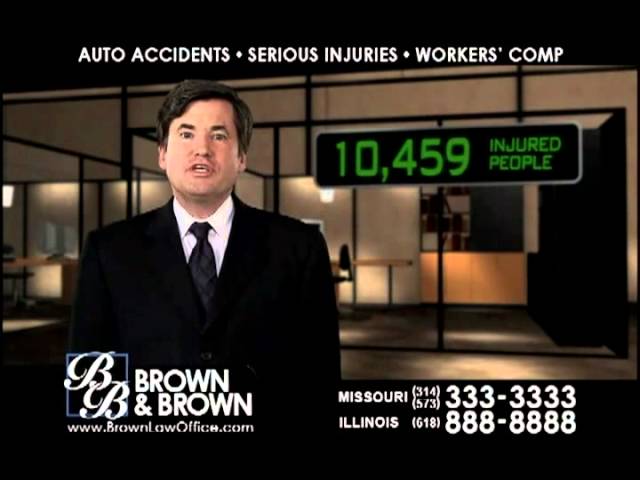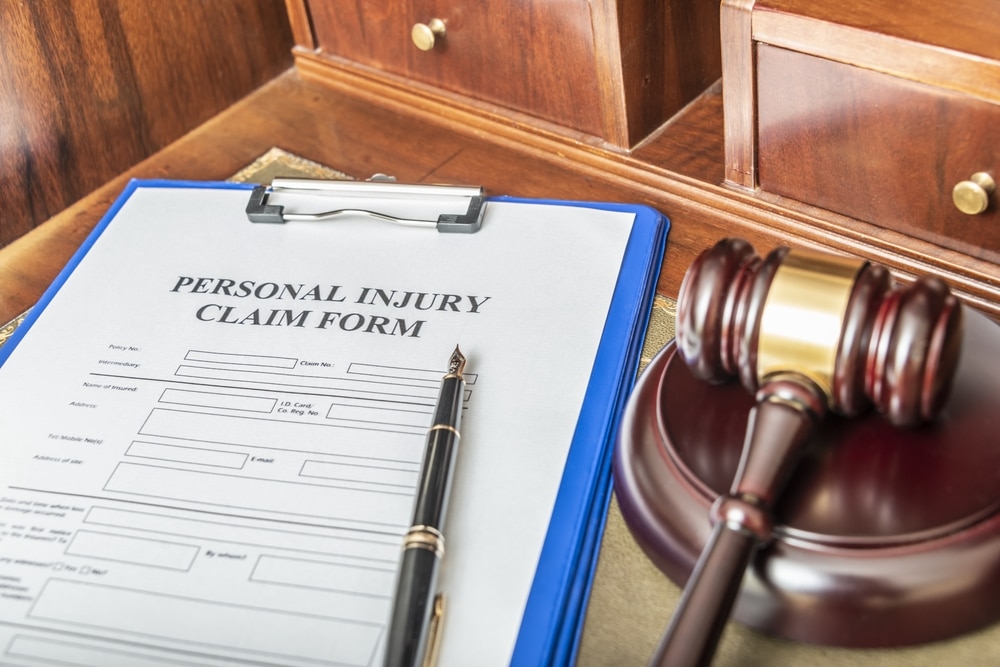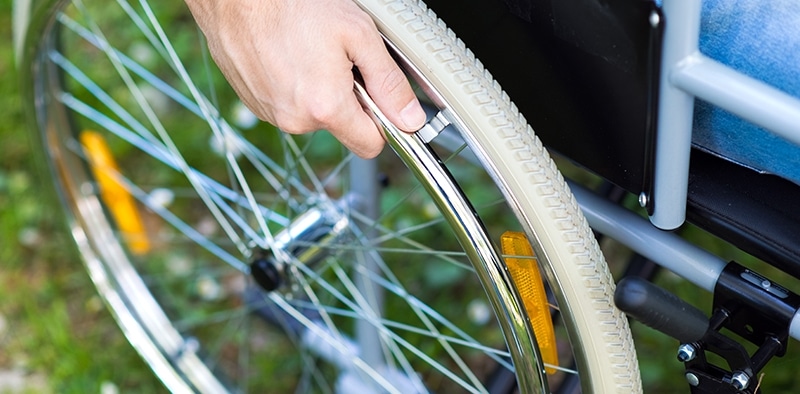Catastrophic Injury Lawyers Serving Missouri & Illinois
Personal injury may refer to any injury sustained in an accident. Thousands of accidents occur in St. Louis and Illinois daily, most resulting in little to no injury. Some accidents, however, cause serious injuries that will impact every aspect of your life, result in expensive medical bills, and may even produce permanent physical and emotional damages.

At Brown & Brown, LLP, we know that accidents happen suddenly and without warning. They can leave you with unexpected pain, looming medical costs, and lost income when you need it most. Our personal injury attorneys have experience in a range of practice areas, including severe and catastrophic injuries. They will focus on your case, giving you the space and protection you need to focus on what really matters: your recovery.
If you have been injured due to someone else's recklessness or carelessness, contact us to discuss your case for free. We maintain two offices in the Greater St. Louis area, allowing us to serve personal injury victims in Eastern Missouri and Southern Illinois. To schedule your complimentary case review, please call our St. Louis office at 314-333-3333 or 618-888-8888 if you're in Illinois.
Our Personal Injury Lawyers Will Come to You
The personal injury attorneys at Brown & Brown understand that, due to your injuries or circumstances, you may be unable to drive to one of our offices for a consultation. We do not believe this should interfere with your rights or ability to seek justice following an accident. If you can't come to us, we'll come to you, without hesitation. And remember: If we don't win your case, you won't pay a thing for our services. You have nothing to lose by calling us for a free review of your case, your rights, and the best options available for securing the full compensation you are due.

- Common Causes of Personal Injury
- Types of Personal Injury Cases We Handle
- The Personal Injury Process
- Types of Compensation in a Personal Injury Case
- Why Choose Brown & Brown for Your Personal Injury Claim
- Our Major Personal Injury Verdicts and Settlements
- Personal Injury FAQs
- Contact Us to Schedule a Complimentary Case Review
Leading Causes of Severe Personal Injury
While any accident can lead to injury, some are more likely to result in serious and lasting complications than others. The top causes of serious injury in St. Louis include:
- Motor vehicle accidents: Motor vehicle accidents may include car accidents, truck accidents, and motorcycle accidents, some of which will result in permanent injury. Motor vehicle accidents may also include pedestrian accidents or accidents involving bicyclists. In many cases, these are serious or fatal, and all too often, they affect our most vulnerable citizens, like children and the elderly.
- Accidents on private or commercial property: Slip and fall accidents on poorly maintained properties, assault or robbery on improperly secured properties, elevator and escalator accidents, animal attacks, and even injury from toxic fumes or chemicals may all be examples of premises liability. When you are injured on someone else's property – commercial or private – due to conditions that should have been avoidable, you may be entitled to seek compensation for all related damages.
- Defective products: From vehicle defects like faulty airbags and ignition switches to children's toys, medical devices, and consumer electronics, defective products that cause injury or death should be examined by a personal injury lawyer. In many cases, defective products result in mass tort litigation due to the sheer number of people they injure.

When you sustain injury in an accident that you did not cause, insurance companies may be quick to offer a settlement. These are based on formulas that make great assumptions about the nature of your injury and the lasting complications it may cause. Before you let an insurance company assume what your case is worth, call our St. Louis or Illinois office to speak to one of our attorneys for free. We answer calls, even on weekends, and when not available immediately, we will return your call quickly to ensure you are not left in the lurch.
Personal and Catastrophic Injury Representation
In some fortunate cases, people can walk away from an accident with nothing but cuts, bruises, and rattled nerves. However, the outcome can also be quite different. You may require surgery, emergency treatment, or rehabilitative therapy. You may be unable to work for extended periods of time. You may even be faced with permanent disabilities or lasting emotional scars.
Whatever your situation, Brown & Brown wants to help you and your family navigate your legal options and begin your road to recovery.
We can help with cases involving:
- Traumatic brain injuries (TBIs): Traumatic brain injuries can irreversibly impact your quality of life. They can also drastically affect your personality and ability to control bodily functions.
- Spinal cord injuries: The spinal cord relays messages from your brain to the rest of your body. Spinal cord injuries can disrupt this communication and cause complete or partial paralysis.
- Neck and back injuries: The force that can be put upon the body in an accident can cause severe neck and back injuries, including whiplash and fractures. This may require you to wear a neck brace for a while, but it can also result in lasting pain, chronic complications, or partial to complete paralysis.
- Electrocution: Electric shock can affect the heart, nerves, and brain. It can also cause severe burns or even death. Electrical accidents can occur when building owners, manufacturers, or power companies don't adhere to safety regulations.
- Burn injuries: Severe burn injuries often require acute treatment at a burn center, skin grafting, and even reconstructive surgery. Victims may also need extensive rehabilitation, including job training in some cases.
- Broken bones and internal injuries: Broken bones are some of the most common injuries in any type of accident. Bones can fracture or break when they absorb the impact of a collision, collide with another object, or are twisted in a wreck.
- Dog bites: Dog bites can cause serious injuries. Dog owners are responsible for their dogs' behavior and any harm they may cause.
- Wrongful death: Losing a loved one in a fatal accident can be one of the most devastating experiences anyone can endure. Unlike criminal charges, the goal of a wrongful death claim is to provide the family of the fatally injured person with compensation for their losses.
The Personal Injury Process: A Timeline
Every personal injury claim is unique, but each begins with an accident in which someone is injured due to no or only limited fault of their own. Because they deal with demonstrable damages caused by an injury, the very first step in any personal injury claim is seeking medical treatment. Even if you are cleared from the scene of an accident, if you have sustained an injury, it is vital to the success of your claim that you receive a full medical examination from a qualified and trusted physician. Based on your diagnosis, you will likely have the option to settle with an insurance company or to move forward with a claim.
Should you choose to move forward, a typical personal injury claim will include:
- The initial consultation and case evaluation: This is where you will present your claim and any evidence, such as medical records, that you have to support it to one of our attorneys.
- The investigation and review: During this process, we will review your evidence and gather some of our own to determine if you have cause to file suit.
- The demand. If you have a viable claim, we will make a demand for compensation to the appropriate party. They will have time to either comply, counter, or deny our demand.
- Filing the suit. If the demand is denied, we will file a lawsuit and begin the process of preparing for a trial.
- The discovery process. This is the longest part of the injury claim process and involves attorneys from both sides gathering evidence, conducting interviews and depositions, and building their respective cases.
- Settlement negotiations. Following the discovery, attorneys from both sides will meet to see if a settlement can be negotiated.
- Mediation. If a settlement cannot be negotiated, the case will head to mediation, where a neutral third party will attempt to negotiate a settlement that is suitable to all parties.
- Litigation. If mediation fails, the case will head to trial, where both sides will present evidence to a jury in an attempt to secure the verdict most desirable to their client. Very few personal injury claims necessitate a trial, but our lawyers prepare every case for this eventuality.
A personal injury claim can take a few short months or several years, depending on its complexity, the amount of time discovery takes, and other relevant factors. This is just one reason to contact one of our offices immediately following an accident, so we can begin working on your case immediately.
Statute of Limitations
The statute of limitations to file a personal injury claim in Missouri is a generous five years from the accident date or the date the injury became known. In Illinois, you have only two years to take action.
In both cases, it is best not to wait. Waiting can complicate the investigation, lengthen the discovery period, and delay your settlement. Contact our St. Louis office, or if you are in Illinois, call 618-888-8888 today to schedule a complimentary consultation and let us get to work on your case before time runs out.

Personal Injury Compensation

At Brown & Brown, we believe that the most effective approach to legal representation is one that is tailored just for you. Our goal is to understand your needs, formulate a customized plan, and relentlessly represent your case. Whether through settlement or trial, we will aggressively pursue what is in your best interests.
Depending on the circumstances of your case, you may be entitled to compensation for:
- Medical expenses
- Lost wages
- Diminished earning capacity
- Pain and suffering
- Permanent disability
- Property replacement or repair
Each case is different, and the damages sought must be designed to meet the actual needs of each individual. During your free initial consultation, we will discuss what you may be entitled to help you make the best decision for you and your family.
Why Choose Brown & Brown?
For more than 30 years, Brown & Brown has been helping victims of serious injury in the Greater St. Louis area get justice. Committed, concerned, and effective, our attorneys offer personalized representation that addresses the actual needs of the individual, enabling us to build comprehensive cases that seek maximum compensation for all damages related to an accident.
Smart, active, and invested in the lives of our clients, we truly care about each person we help and each case we take. We will stand by your side, protect you from the predatory tactics of insurance companies and defense attorneys, and fight tooth and nail to help you secure every penny your injury demands.
No Attorney Fees If We Don't Win Your Case
You most likely have a number of questions about what to expect throughout the course of your personal injury case. When facing mounting medical bills, missing time from work, and uncertainty about your financial future, you may think that you can't afford an accident lawyer on top of everything else.
We understand your concerns, which is why our personal injury attorneys offer free consultations and work on a contingency-fee basis. This means that you don't pay any attorney fees unless we win your case. Call us today. You have nothing to lose.
"The people I talked to at this firm were very helpful, they talked to me, not at me. Explained everything to me that I never understood before, I wasn’t able to get to their office and within two hours after I talked with them they showed up at my home and help me complete the legal process that I require. Others that I called seemed like they wanted me to go out and get answers for them, Brown& Brown did it all for me, couldn’t ask for a better bunch of people. Pleased give them a try you won’t regret it."

Major Personal Injury Verdicts & Settlements
- $37 million arbitration award confirmed as a judgment involving two minor children who incurred severe injuries, including head injuries and paraplegia.
- $1.95 million settlement for motorcyclist struck by a car (van) resulting in serious injury to the arm.
- $500,000 settlement for a client who suffered from severe lacerations, closed head injury, broken forearm, and broken ankle.
- $300,00 settlement involving a 37-year-old man injured in an ATV rollover who incurred a spiral fracture to his lower leg.
- $242,000 settlement involving five minor children who incurred injuries after being struck by a car while they were walking.
- $275,000 settlement for a 61-year-old woman who suffered injuries to her head, neck, and back, as well as multiple foot fractures.
- $250,000 policy limits recovery for a sheriff's deputy who was rear-ended while effectuating a traffic stop.
- $250,000 policy limits settlement for a motorcyclist who was hit by an inattentive driver and sustained serious injuries to his leg.
- $250,000 policy limits settlement for a 48-year-old woman involved in a motor vehicle collision who suffered a closed head injury, neck and back strain, shoulder injury, and knee injury.
- $170,000 premises liability claim resulting in a broken leg.
- $155,000 settlement involving a 73-year-old woman who fractured her femur and hip after falling on ice at her condo complex. The claim was denied prior to filing the lawsuit.
- $137,000 settlement for a 51-year-old man with a torn rotator cuff from a multi-vehicle collision.
- $100,000 policy limits settlement for a 55-year-old woman involved in a motor vehicle collision who suffered disc injuries to her neck and back. The top offer prior to filing the suit was $19,000.
- $100,000 policy limits settlement for a 58-year-old pedestrian who was struck by a motor vehicle and suffered multiple pelvis fractures.
- $100,000 policy limits settlement for a 75-year-old man involved in a motor vehicle collision who suffered a broken leg and injuries to his neck and back. The top offer prior to filing the suit was $49,000.
- $100,000 settlement for self-employed business owner who suffered injuries to his neck, back, and shoulders.
- $100,000 settlement for a client who was rear-ended and suffered from a neck and back strain.
- $100,000 policy limits for concussion, disc bulging in the back, and general whiplash.
- $100,000 policy limits recovery to a yoga instructor who sustained injuries to her back and lost significant wages.
- $96,500 settlement for a 91-year-old man who sustained a broken sternum and three broken ribs in a collision.
- $35,000 for a grandmother who, prior to our retention, was offered $4,000 by the insurance company as "go away" money.
Personal Injury Lawyer FAQ
How Do You Pick a Personal Injury Lawyer?
The best way to choose a personal injury lawyer is through a one-on-one consultation. During this consultation, you should ask all your questions and pay close attention to how the attorney answers. If you do not feel 100% confident in a lawyer, keep looking.
Reputable personal injury attorneys work on a contingency basis. Your initial consultation should absolutely be free. So, too, should all the work your lawyer does until your case is won. Your attorney should not be paid if you do not win your case.
What Questions Should You Ask a Personal Injury Lawyer?
Ten good questions to ask your potential personal injury lawyer during your free initial consultation are:
- What are your primary areas of practice?
- How long have you been in practice?
- Will you, personally, handle my case?
- How many cases do you typically work on at the same time?
- What types of results have you obtained in cases similar to mine?
- Can you point me towards some of your most successful verdicts and settlements?
- Can you point me towards client testimonials?
- What awards and recognitions have you/your firm received?
- What external resources do you/your firm use for cases?
- Do you work on a contingency basis?
If you are dissatisfied with the answers you are given, keep looking. A consultation is not a commitment. It is vital for the success of your case that you feel confident in your attorney at all times.
What Percentage Does an Injury Attorney Get?
The percentage an injury lawyer receives depends on the contingency agreement. In many cases, this will be 33% or 1/3 of the total award.
Some contingency agreements are more favorable for attorneys than for clients. They may even including fees and interest. When you choose an injury lawyer, select one who is honest and upfront about all costs, and make sure you do not sign any agreements you do not actually agree with.
You do not have to select the first attorney you talk to. If you'd like, you can talk to dozens or hundreds before choosing your personal injury lawyer.
How Much Can I Get for a Bodily Injury Claim?
Each personal injury claim is unique. The amount awarded through settlement or verdict can vary widely and is dependent on the extent of damage and the extent to which it will impact the continued health, happiness, and success of the victim.
The best way to learn what your claim is worth is through a free consultation with a qualified injury lawyer.
How Do Courts in St. Louis and Illinois Define
Courts in Missouri and Illinois typically define catastrophic injuries as those that cause long-term or permanent disability, disfigurement, or a major disruption to daily life. These injuries usually involve the brain, spinal cord, or limbs. They may also include paralysis, amputations, or traumatic brain injuries.
The classification matters because it can influence the compensation amount and legal strategy. Catastrophic injury claims usually account for future medical bills, lost income, and continued pain and suffering, given the severity of the impact on the person's ability to live and work independently.
What Evidence Is Important in a Severe Injury Claim?
Strong evidence is crucial in a severe injury claim. It can:
- Show the extent of injuries: Medical records, diagnostic images, and physician statements.
- Help establish liability: Accident reports, witness statements, and photographs from the scene.
- Demonstrate lost wages: Pay stubs, tax records, and employment verification.
A detailed journal that records symptoms, emotional struggles, and daily challenges can also strengthen the claim. It shows how the injury affects day-to-day life beyond the immediate physical damage.
Can I Pursue a Claim if I Was Partially at Fault for My Injury?
Yes, you may still be able to pursue a claim even if you were partially at fault.
Missouri follows a pure comparative fault rule. This means your percentage of fault reduces your compensation, but it's not eliminated.
In Illinois, a modified comparative fault rule applies. If you are considered 50% or less responsible, you can recover damages, but your award is reduced by your degree of fault. You cannot recover damages if you are more than 50% responsible in Illinois.
The attorneys and Brown & Brown can help determine how these rules apply to your situation.
How Is Pain and Suffering Calculated in a Severe Injury Case?
Pain and suffering are typically calculated by examining:
- The severity of the injury
- The impact on daily life
- The emotional and psychological toll
In severe injury cases, attorneys often use a multiplier method. They multiply actual economic damages (like medical bills) by a number that reflects the seriousness of the injury.
Another approach is the per diem method. With this approach, attorneys assign a daily value to pain and suffering for the length of recovery. They consider factors like permanent disability, scarring, mental distress, and a loss of enjoyment of life when determining an appropriate value.
What Is the Difference Between an Insurance Settlement and a Court Award?
An insurance settlement is a negotiated agreement reached between the injured person and the insurance company. It results in a lump-sum payment without going to trial. Settlements are typically faster and less costly, but they may result in lower compensation.
A judge or jury determines a court award after a trial. It may include economic, non-economic, and sometimes punitive damages. Court awards are potentially higher. However, they involve more uncertainty and longer timelines.
An attorney can help weigh the risks and benefits of accepting a settlement versus taking the case to court.
What Challenges Often Arise in Serious Injury Cases?
Disputes over liability can complicate serious injury cases, the extent of the injury, and the amount of compensation owed. Examples of potential challenges include:
- Insurance companies sometimes downplay the severity of injuries or argue that pre-existing conditions are to blame.
- Expert testimony is needed to estimate future medical costs and loss of earning capacity. This information can be contested.
- Proving non-economic damages like pain and suffering can be hard without strong documentation.
- If multiple parties are involved, sorting out responsibility can add complexity.
Schedule Your Free Personal Injury Consultation Today
If you've been injured because of someone else's negligence, it's important to discuss your case for free with one of our experienced injury attorneys as soon as possible. If you can't travel to us, we will come to you.
If you are seriously injured anywhere in Missouri, just dial 3s: 314-333-3333 or 573-333-3333. If injured in Illinois, just dial 8s: 618-888-8888. We help clients from the Greater St. Louis area and all surrounding Missouri and Illinois communities.



